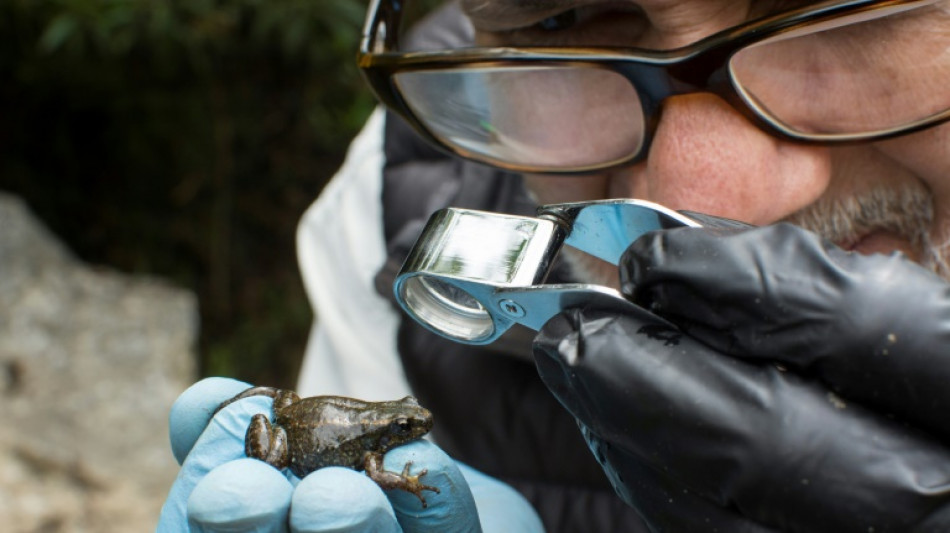
-
 Japan PM's tax giveaway roils markets and worries voters
Japan PM's tax giveaway roils markets and worries voters
-
Amid Ukraine war fallout, fearful Chechen women seek escape route

-
 Rybakina surges into Melbourne semis as Djokovic takes centre stage
Rybakina surges into Melbourne semis as Djokovic takes centre stage
-
Dollar struggles to recover from losses after Trump comments

-
 Greenland blues to Delhi red carpet: EU finds solace in India
Greenland blues to Delhi red carpet: EU finds solace in India
-
Will the EU ban social media for children in 2026?

-
 Netherlands faces 'test case' climate verdict over Caribbean island
Netherlands faces 'test case' climate verdict over Caribbean island
-
Rybakina stuns Swiatek to reach Australian Open semi-finals

-
 US ouster of Maduro nightmare scenario for Kim: N. Korean ex-diplomat
US ouster of Maduro nightmare scenario for Kim: N. Korean ex-diplomat
-
Svitolina credits mental health break for reaching Melbourne semis

-
 Japan's Olympic ice icons inspire new skating generation
Japan's Olympic ice icons inspire new skating generation
-
Safe nowhere: massacre at Mexico football field sows despair

-
 North Korea to soon unveil 'next-stage' nuclear plans, Kim says
North Korea to soon unveil 'next-stage' nuclear plans, Kim says
-
French ex-senator found guilty of drugging lawmaker

-
 US Fed set to pause rate cuts as it defies Trump pressure
US Fed set to pause rate cuts as it defies Trump pressure
-
Sleeping with one eye open: Venezuelans reel from US strikes

-
 Venezuela's acting president says US unfreezing sanctioned funds
Venezuela's acting president says US unfreezing sanctioned funds
-
KPop Demon Hunters star to open Women's Asian Cup

-
 Trump warns of 'bad things' if Republicans lose midterms
Trump warns of 'bad things' if Republicans lose midterms
-
Russian strikes in Ukraine kill 12, target passenger train

-
 With Maduro gone, Venezuelan opposition figure gets back to work
With Maduro gone, Venezuelan opposition figure gets back to work
-
Celebrities call for action against US immigration raids

-
 Rubio to warn Venezuela leader of Maduro's fate if defiant
Rubio to warn Venezuela leader of Maduro's fate if defiant
-
Denver QB Nix 'predisposed' to ankle injury says coach

-
 Lula, Macron push for stronger UN to face Trump 'Board of Peace'
Lula, Macron push for stronger UN to face Trump 'Board of Peace'
-
Prass stunner helps Hoffenheim go third, Leipzig held at Pauli

-
 Swiss Meillard wins final giant slalom before Olympics
Swiss Meillard wins final giant slalom before Olympics
-
CERN chief upbeat on funding for new particle collider

-
 Trump warns US to end support for Iraq if Maliki returns
Trump warns US to end support for Iraq if Maliki returns
-
Judge reopens sexual assault case against goth rocker Marilyn Manson

-
 South Korea's ex-first lady to learn verdict in corruption case
South Korea's ex-first lady to learn verdict in corruption case
-
Rosenior dismisses Chelsea exit for 'untouchable' Palmer

-
 Markram powers South Africa to win over West Indies
Markram powers South Africa to win over West Indies
-
Vladimir Padrino: Venezuela's military power broker

-
 Amazon closing Fresh and Go stores in Whole Foods push
Amazon closing Fresh and Go stores in Whole Foods push
-
Koepka nervous about game and fans in PGA Tour return

-
 Trump's Iowa trip on economy overshadowed by immigration row
Trump's Iowa trip on economy overshadowed by immigration row
-
Dortmund coach says Inter Milan are improved under Chivu

-
 US border chief in Minneapolis as Trump tries to calm crisis
US border chief in Minneapolis as Trump tries to calm crisis
-
What to know about America's colossal winter storm

-
 Iran warns against 'instability' after US strike group arrives
Iran warns against 'instability' after US strike group arrives
-
GM reports quarterly loss but boosts shareholder returns

-
 US banks fight crypto's push into Main Street
US banks fight crypto's push into Main Street
-
NFL Bills make offensive coordinator Brady new head coach

-
 TikTok settles hours before landmark social media addiction trial
TikTok settles hours before landmark social media addiction trial
-
Newcastle braced for 'ultimate test' against PSG after storm disruption

-
 Brook blitz ends Sri Lanka's unbeaten home run, England clinch series
Brook blitz ends Sri Lanka's unbeaten home run, England clinch series
-
LVMH 2025 net profit drops 13% to 10.9 bn euros

-
 Philip Glass pulls Kennedy Center premiere after Trump takeover
Philip Glass pulls Kennedy Center premiere after Trump takeover
-
Slot says Liverpool must fix 'very bad cocktail'


Please don't croak: Setting the mood to save Venezuelan frog
Enormous expectations rest on the tiny endangered amphibian perched on a rock in a plastic box: the Mucuchies' Frog needs to produce offspring if its species is to survive.
The dark, spotted creature is categorized as "critically endangered" on the Red List of threatened species of the International Union for Conservation of Nature (IUCN) -- the last step before an animal is declared "extinct in the wild."
But there is cause for hope.
Driven by a "passion" to save the unassuming two-centimeter (0.8-inch) critter, biologist Enrique La Marca and a team launched a breeding project at the REVA amphibian conservation center in Merida in Venezuela's northwest.
To date, some two dozen captured adults have created about 100 tiny jumpers released into nature, said La Marca -- more or less doubling the previously known number of Mucuchies' Frogs in the wild.
That should help the species, which according to the Red List, has seen 98 percent of its habitat in the forests of the Venezuelan Andes lost to deforestation.
Today, its entire population is limited to an area smaller than 10 square kilometers (3.9 square miles.)
- Streams dried up -
"Most of the population disappeared... between 15 and 25 years ago" from areas around the region of Mucuchies where it was once abundant, said La Marca.
The main reasons, according to the IUCN: crops and aquaculture encroaching on nature and polluting water sources, as well as the abstraction of surface water for irrigation.
"There are streams that have dried up and springs that have decreased significantly... All this has a negative impact on organisms that are directly associated with water," La Marca told AFP.
The Mucuchies' Frog is a species that breeds during the wet season, laying eggs onto leaf litter.
The male protects the eggs until they hatch, then carries the tadpoles on his back and releases them into small pools where they complete their development.
- Frog song, 'greatest joy' -
But before the REVA project started in 2018, "we didn’t know what it (the frog) fed on, what reproduction was like, we were improvising and learning on the fly," said La Marca.
They have since ascertained that for an amorous mood, the frog requires a sprinkling of plants such as bromelias, rocks and leaves for frolicking, the sexy sounds of a simulated stream, and a steady diet of insects and larvae.
The resultant offspring are reared in the lab for about a year after making the transition from tadpole to four-legged frog before they are released.
Then comes the "maximum challenge," according to La Marca: "to survive in the new natural conditions they will face."
On frequent field visits, the team searches for the slippery frogs between stones or on river banks, but it is hard to keep track of all of the bashful brood.
"The greatest joy comes when... we notice that there are more songs in the place, an indication that they are procreating," said La Marca.
Y.Bouchard--BTB




